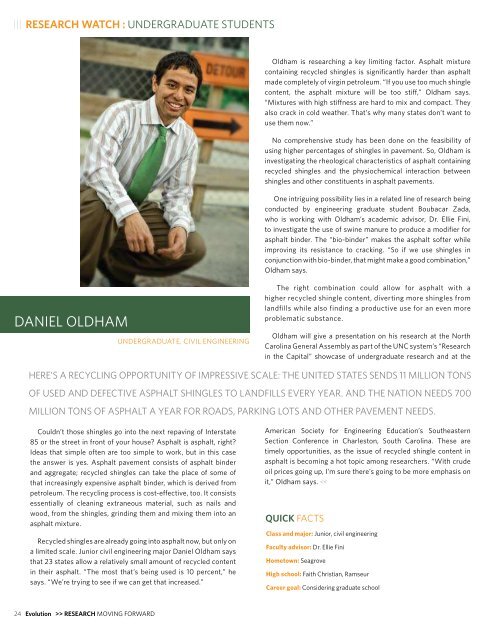bIoMEdICAL RESEARCH - North Carolina A&T State University
bIoMEdICAL RESEARCH - North Carolina A&T State University
bIoMEdICAL RESEARCH - North Carolina A&T State University
Create successful ePaper yourself
Turn your PDF publications into a flip-book with our unique Google optimized e-Paper software.
||| <strong>RESEARCH</strong> wATCH : UNDerGrADUAte StUDeNtS<br />
DANIeL oLDhAm<br />
UNDerGrADUAte, CIVIL eNGINeerING<br />
Couldn’t those shingles go into the next repaving of Interstate<br />
85 or the street in front of your house? Asphalt is asphalt, right?<br />
Ideas that simple often are too simple to work, but in this case<br />
the answer is yes. Asphalt pavement consists of asphalt binder<br />
and aggregate; recycled shingles can take the place of some of<br />
that increasingly expensive asphalt binder, which is derived from<br />
petroleum. the recycling process is cost-effective, too. It consists<br />
essentially of cleaning extraneous material, such as nails and<br />
wood, from the shingles, grinding them and mixing them into an<br />
asphalt mixture.<br />
recycled shingles are already going into asphalt now, but only on<br />
a limited scale. Junior civil engineering major Daniel oldham says<br />
that 23 states allow a relatively small amount of recycled content<br />
in their asphalt. “the most that’s being used is 10 percent,” he<br />
says. “We’re trying to see if we can get that increased.”<br />
oldham is researching a key limiting factor. Asphalt mixture<br />
containing recycled shingles is significantly harder than asphalt<br />
made completely of virgin petroleum. “If you use too much shingle<br />
content, the asphalt mixture will be too stiff,” oldham says.<br />
“mixtures with high stiffness are hard to mix and compact. they<br />
also crack in cold weather. that’s why many states don’t want to<br />
use them now.”<br />
No comprehensive study has been done on the feasibility of<br />
using higher percentages of shingles in pavement. So, oldham is<br />
investigating the rheological characteristics of asphalt containing<br />
recycled shingles and the physiochemical interaction between<br />
shingles and other constituents in asphalt pavements.<br />
one intriguing possibility lies in a related line of research being<br />
conducted by engineering graduate student Boubacar Zada,<br />
who is working with oldham’s academic advisor, Dr. ellie fini,<br />
to investigate the use of swine manure to produce a modifier for<br />
asphalt binder. the “bio-binder” makes the asphalt softer while<br />
improving its resistance to cracking. “So if we use shingles in<br />
conjunction with bio-binder, that might make a good combination,”<br />
oldham says.<br />
the right combination could allow for asphalt with a<br />
higher recycled shingle content, diverting more shingles from<br />
landfills while also finding a productive use for an even more<br />
problematic substance.<br />
oldham will give a presentation on his research at the <strong>North</strong><br />
<strong>Carolina</strong> General Assembly as part of the UNC system’s “research<br />
in the Capital” showcase of undergraduate research and at the<br />
here’S A reCyCLING oPPortUNIty of ImPreSSIVe SCALe: the UNIteD StAteS SeNDS 11 mILLIoN toNS<br />
of USeD AND DefeCtIVe ASPhALt ShINGLeS to LANDfILLS eVery yeAr. AND the NAtIoN NeeDS 700<br />
mILLIoN toNS of ASPhALt A yeAr for roADS, PArKING LotS AND other PAVemeNt NeeDS.<br />
24 Evolution >> <strong>RESEARCH</strong> moVING forWArD<br />
American Society for engineering education’s Southeastern<br />
Section Conference in Charleston, South <strong>Carolina</strong>. these are<br />
timely opportunities, as the issue of recycled shingle content in<br />
asphalt is becoming a hot topic among researchers. “With crude<br />
oil prices going up, I’m sure there’s going to be more emphasis on<br />
it,” oldham says.



